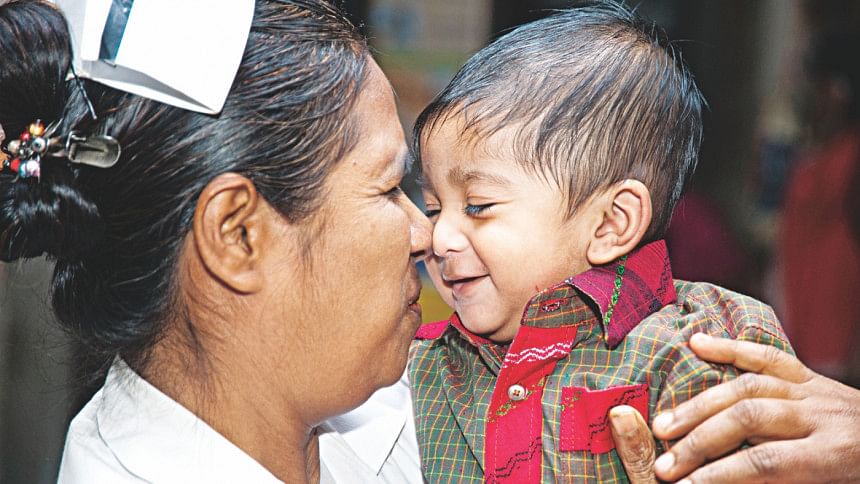Measles-Rubella Campaign 2020

Throughout the ages, humankind has faced the threat of multiple viruses and diseases. Mothers, the primary caregivers of their children, have always been more aware and conscious of their children's surroundings and about the measures required to shield them from any disease.
To help mothers combat ailments, the Measles-Rubella Campaign 2020, organised all over Bangladesh by the government from 29 February to 21 March, is urging mothers to take some time off their busy schedules to get their children vaccinated with the measles-rubella (MR) vaccine. The vaccines and the protection they offer are worth diverting from hectic daily routines.
This vaccine is beneficial to children's health as the measles virus is one of the most contagious agents ever known and rubella can cause malnutrition, diarrhoea, pneumonia, fevers and rashes respectively along with a number of other health complications. Both the viruses put stress on the immune system and may have long lasting effects on the health of little ones. As there is no specific treatment for these diseases, it is necessary to get children vaccinated to prevent transmission through immunisation. The campaign is providing mothers and guardians a clear route of communication regarding the process and what to look out for.
The campaign aims to fulfil the national measles elimination target by setting up in different locations all over Bangladesh, in both urban and rural areas, with teams composed of two skilled vaccinators and three trained volunteers. This ensures that the people involved in the procedure are experienced and aware of what they are doing and that the chances of things going south is zero to none.
The campaign will be focusing on vaccinating all children aged between nine months and 10 years of age to prevent transmission of measles and rubella virus. Children within this age limits are prone to these diseases given that an immunity gap exists more prominently. However, it is also the perfect time to most effectively interrupt transmission of the viruses.
What to know about the campaign?
The first week of the campaign, from 29 February to 5 March, will focus on education institutes. The campaign will then expand to upazila health complexes during the second and third week from 7 March to 21, operating for twelve days from 8 AM to 3 PM without a break except on Friday and government holidays. Other additional sessions will also be available for people in marketplaces, plantation areas, ferry ghats, rice fields, orphanages and so on.
In the urban areas, the City Corporation wards will have one fixed site (sadar hospitals, medical college hospitals, City Corporation Hospitals/Clinics, NGO Hospitals/Clinics etc.) operating for 12 days along with outreach sessions, HTR sessions and also having other additional sessions.
Locations for children's vaccination during the campaign
During the first week of the campaign, children will be vaccinated in educational institutes (schools, kindergartens, madrasas, maktoobs, day care centres, non-formal educational institutes, NGO schools, orphanages, hostels, etc.) and in the fixed vaccination sites. Starting from the second and third week, children will be vaccinated in the community through regular outreach sites, fixed sites, and additional sites.
By having a number of sites, the campaign is trying to make vaccines available to every child in every corner of the country.
FREQUENTLY ASKED QUESTIONS
Who should not be vaccinated?
Mothers might wonder if it would be a smart idea to get their children vaccinated ahead of time. Despite being rightly worried and aware of the vaccination necessity, children under nine months old and above 10 years old should not be vaccinated in this campaign.
There should be no rush to get the vaccine if the child is already sick or suffering from some other illness. The child should be allowed to heal and fully recover before receiving the shot.
If children under ten months of age are vaccinated, will there be any chances of interference with its immunity?
As long as the child is nine months old, there is no need for extra tension. The vaccine is completely harmless for a child this age and assists in immunisation.
If a child is already protected against measles and rubella with routine vaccinations, why is a second dose necessary?
Sometimes one dose is not enough to ensure full protection and there is no such thing as 'being too careful' when it comes to taking care of babies. A second dose could go a long way in guaranteeing protection.
What about side effects?
Every mother worries whether her baby would be able to withstand such a strong vaccine. However, these vaccines come with very little side effects which may not even appear.
Other than being scared of getting the vaccine because of the needles which may cause some anxiety and tension in the child, a minor skin rash and/or a mild fever may arise. Some might even have an allergic reaction. The chances of these reactions are rather slim.
However, in the unlikely case that symptoms get too heavy, no time should be wasted in taking the child to a health facility for treatment.
The Measles-Rubella Campaign 2020 is fighting to combat the rising number of outbreaks in recent times especially among the urban elite community. Through this campaign, mothers and fathers have a suitable and perfect opportunity to vaccinate their child/children without any worries. Added to that, the campaign offers an open mode for communication regarding the vaccine. With proper knowledge and incentive, families can stay shielded from these viruses and also keep the youngsters happy and in full health for years to come.
Photo courtesy: UNICEF Bangladesh

 For all latest news, follow The Daily Star's Google News channel.
For all latest news, follow The Daily Star's Google News channel. 



Comments